Emotet infection with Cobalt Strike
Introduction
Although I haven't been posting examples lately, Emotet has remained active since I last wrote an ISC diary about it in February 2022. Today on Thursday 2022-07-07, I have a new example of an Emotet infection with Cobalt Strike to share.
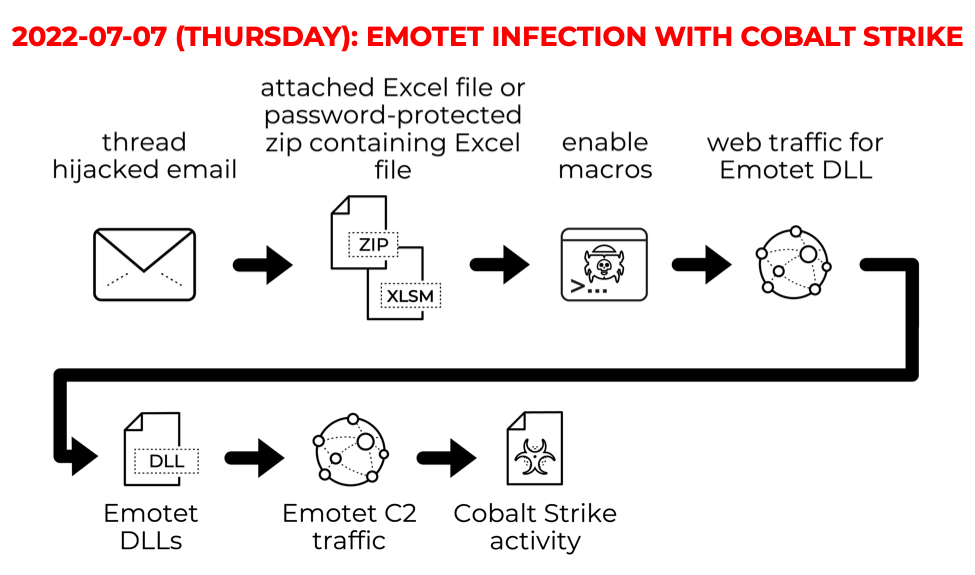
Shown above: Flow chart from today's Emotet activity on Thursday 2022-07-07.
Images from the infection
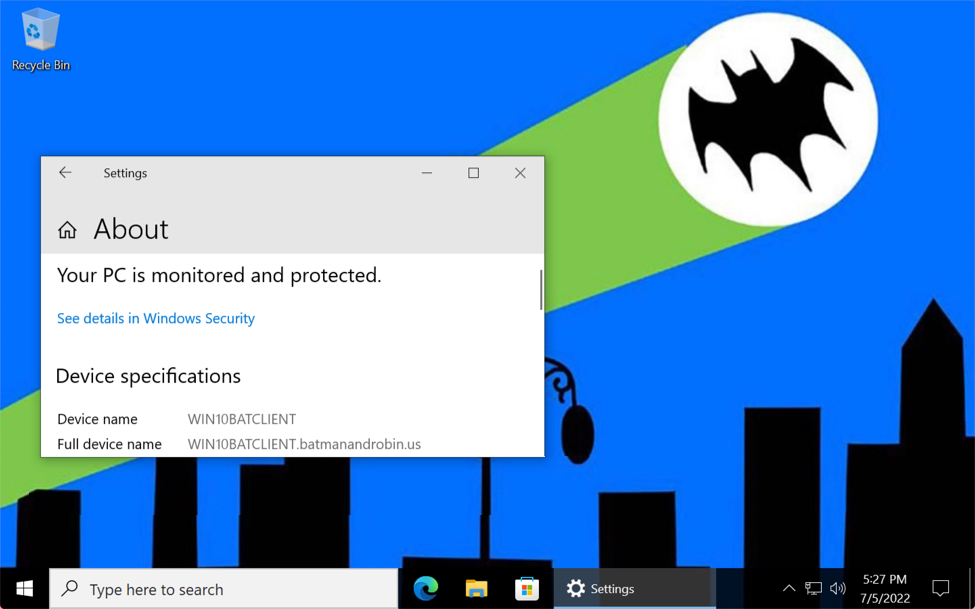
Shown above: Desktop from the Windows host in my lab used for today's Emotet infection.
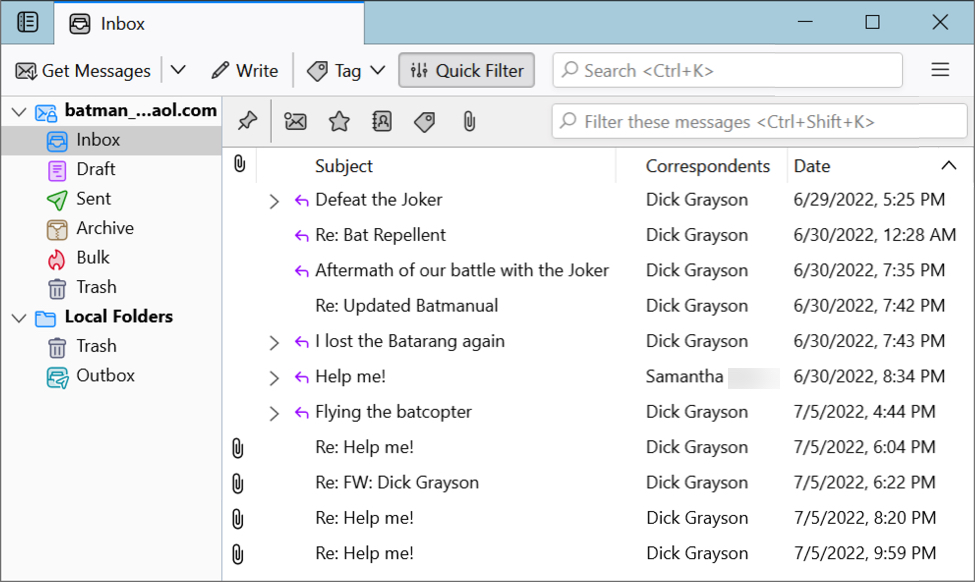
Shown above: Email client I had populated with messages before today's infection. The last four messages with attachments are Emotet malspam based on a previous Emotet infection.
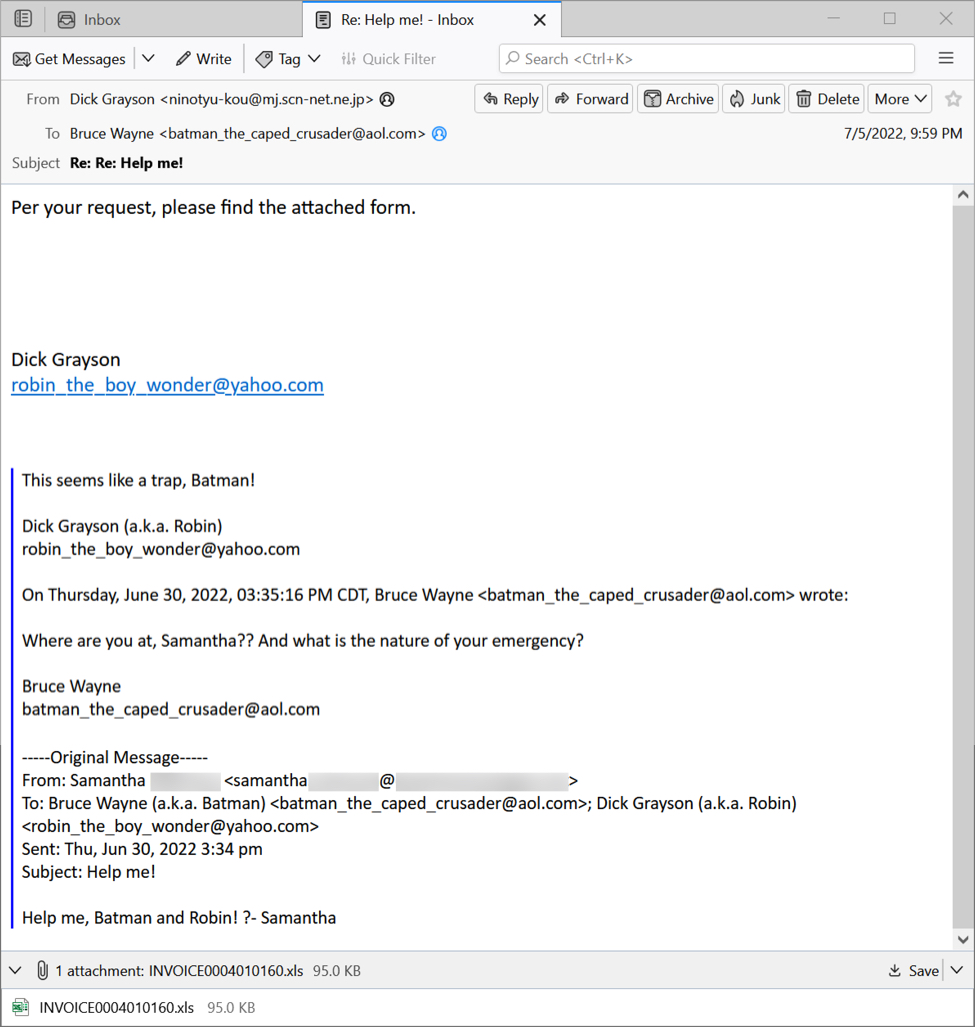
Shown above: Emotet malspam used for today's infection.
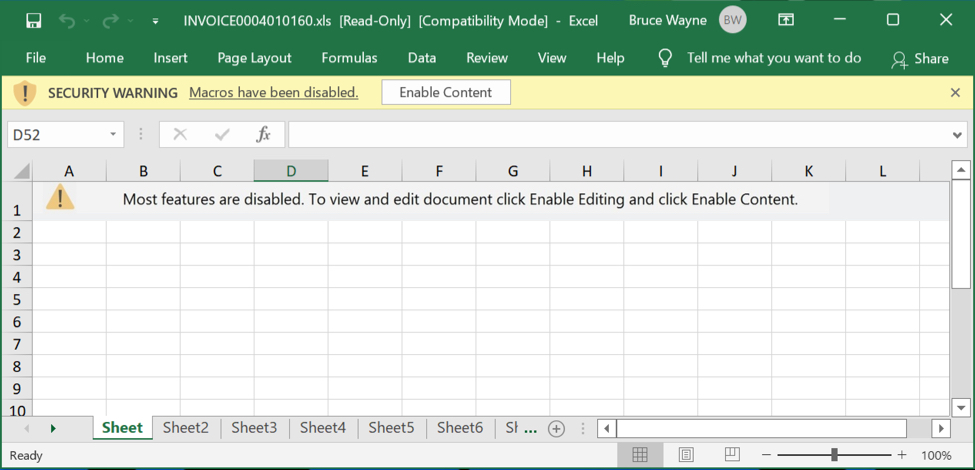
Shown above: Malicious Excel spreadsheet used for today's infection.
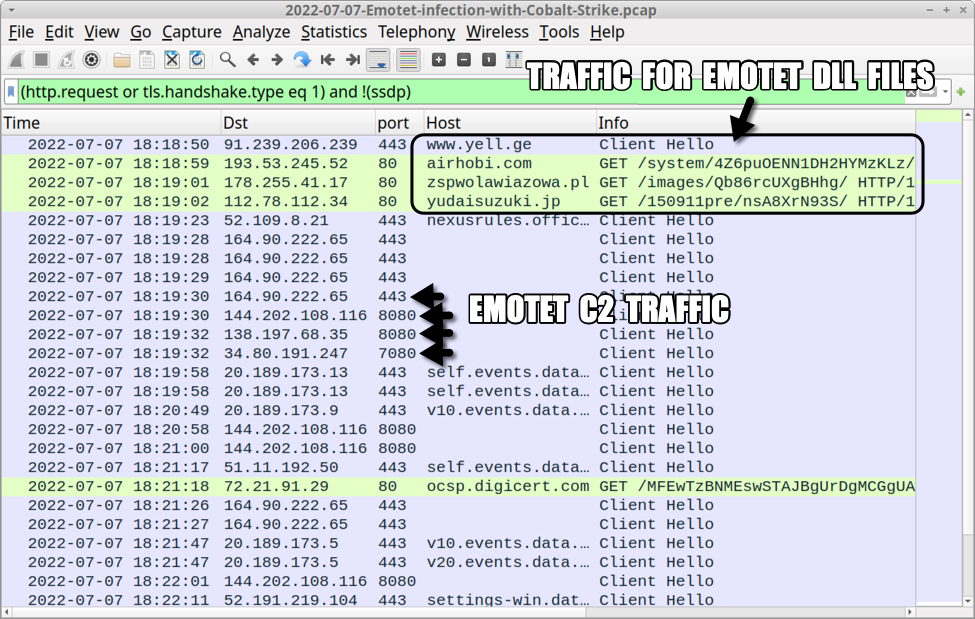
Shown above: Traffic from the infection filtered in Wireshark (1 of 2).
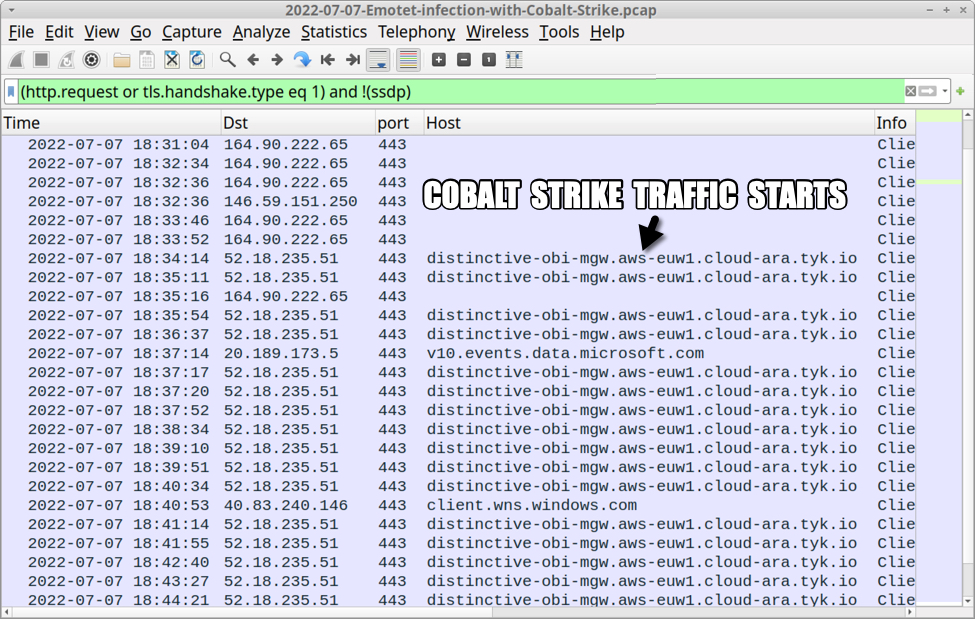
Shown above: Traffic from the infection filtered in Wireshark (2 of 2).
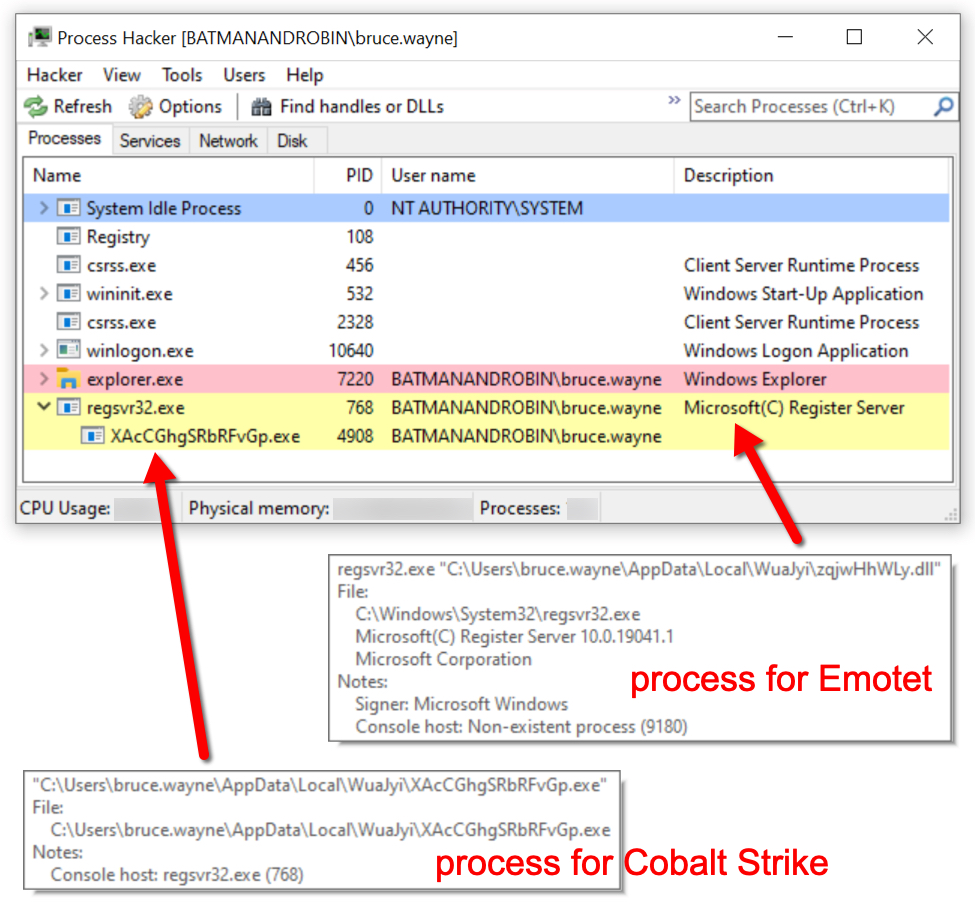
Shown above: Process Hacker showing processes for both Emotet and Cobalt Strike.
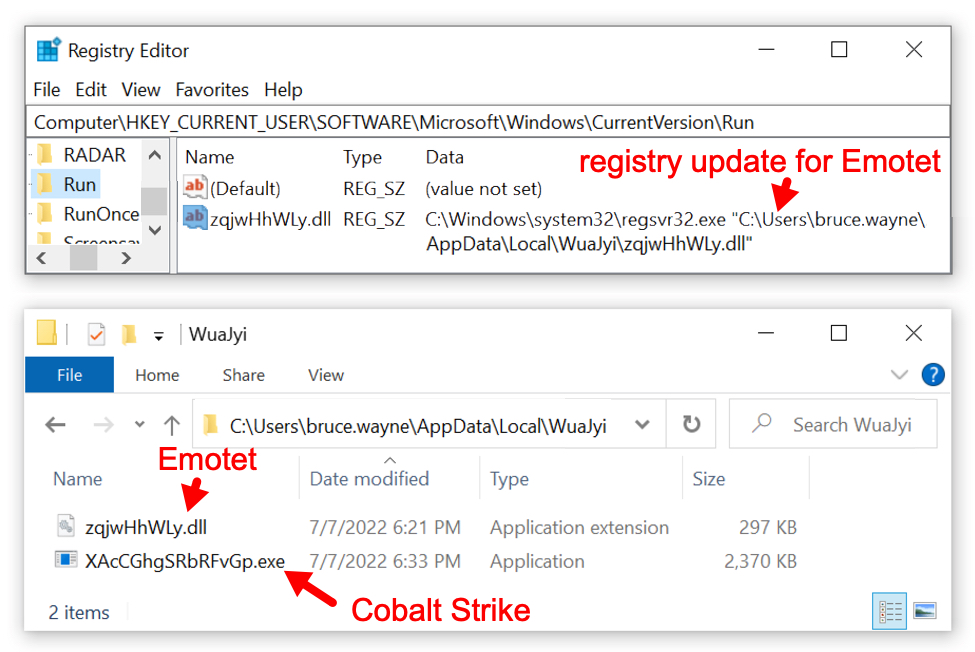
Shown above: Registry update and location of persistent Emotet directory with Cobalt Strike.
Indicators of Compromise (IOCs)
Malware from an infected Windows host:
SHA256 hash: 25d4b42c98e6fb6ea5f91393252a446e0141074765e955b3e561d8b56454a73a
- File size: 97,280 bytes
- File name: INVOICE0004010160.xls
- File description: Excel spreadsheet with macros for Emotet
SHA256 hash: 1e8d9f532c2c5909ba3a8ec8d05fc8bed667dcc0c2592224827b614af7fa3ce1
- File size: 346,112 bytes
- File location: hxxps://www.yell[.]ge/nav_logo/cvLMav68/
- File location: C:\Users\[username]\soci1.ocx
- File location: C:\Users\[username]\AppData\Local\QjPIBTDyAjEJA\AMtPK.dll
- File description: 64-bit DLL for Emotet
- Run method: regsvr32.exe [filename]
SHA256 hash: aa4b22bf31692e70b63dfa0c93888e1795c2d861550f6926c720c3609df4c39a
- File size: 346,112 bytes
- File location: hxxp://airhobi[.]com/system/4Z6puOENN1DH2HYMzKLz/
- File location: C:\Users\[username]\soci2.ocx
- File location: C:\Users\[username]\AppData\Local\WuaJyi\NPpaqh.dll
- File description: 64-bit DLL for Emotet
- Run method: regsvr32.exe [filename]
SHA256 hash: 2c7e18f64c2f229d03afc9b6231f950c0489b684ec0792e75baceb4a03833ff3
- File size: 304,128 bytes
- File location: C:\Users\[username]\AppData\Local\WuaJyi\zqjwHhWLy.dll
- File description: Updated 64-bit Emotet DLL persistent on the infected Windows host
- Run method: regsvr32.exe [filename]
SHA256 hash: 6b4808050c2a6b80fc9945acdecec07a843436ea707f63555f6557057834333e
- File size: 2,426,368 bytes
- File location: C:\Users\[username]\AppData\Local\WuaJyi\XAcCGhgSRbRFvGp.exe
- File description: 64-bit EXE for Cobalt Strike sent to Emotet-infected host
Infection traffic:
URLs generated by Excel macros for Emotet DLL files:
- 91.239.206[.]239 port 443 - hxxps://www.yell[.]ge/nav_logo/cvLMav68/
- 193.53.245[.]52 port 80 - airhobi[.]com - GET /system/4Z6puOENN1DH2HYMzKLz/
- 178.255.41[.]17 port 80 - zspwolawiazowa[.]pl - GET /images/Qb86rcUXgBHhg/
- 112.78.112[.]34 port 80 - yudaisuzuki[.]jp - GET /150911pre/nsA8XrN93S/
Note: The first two returned DLL files, but the second two did not
Emotet C2 traffic:
- 164.90.222[.]65 port 443 - HTTPS traffic
- 144.202.108[.]116 port 8080 - HTTPS traffic
- 138.197.68[.]35 port 8080 - HTTPS traffic
- 34.80.191[.]247 port 7080 - HTTPS traffic
- 201.73.143[.]120 port 8080 - HTTPS traffic
- 146.59.151[.]250 port 443 - HTTPS traffic
- 162.243.103[.]246 port 8080 - HTTPS traffic
Cobalt Strike traffic:
- 52.18.235[.]51 port 443 - distinctive-obi-mgw.aws-euw1.cloud-ara.tyk[.]io - HTTPS traffic
Cobalt Strike URLs:
- distinctive-obi-mgw.aws-euw1.cloud-ara.tyk[.]io - GET /api/v2/login
- distinctive-obi-mgw.aws-euw1.cloud-ara.tyk[.]io - POST /api/v2/status?__cfduid=[19 characters, base64 string]
Final words
While Emotet might not get much high-profile press lately, it remains a continuing presence in our threat landscape. A packet capture (pcap) of today's infection traffic with the email and associated malware samples can be found here.
Brad Duncan
brad [at] malware-traffic-analysis.net


Comments